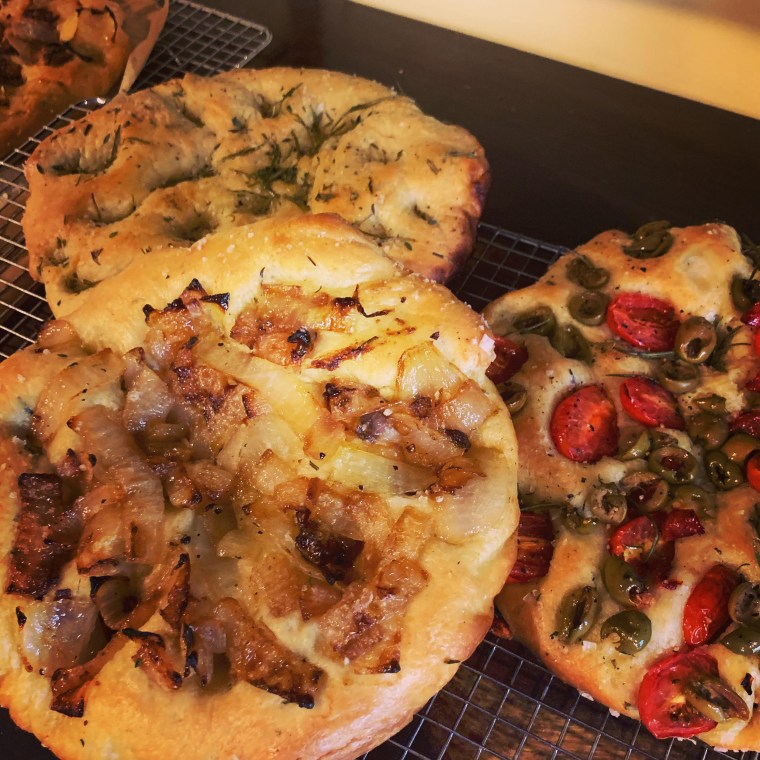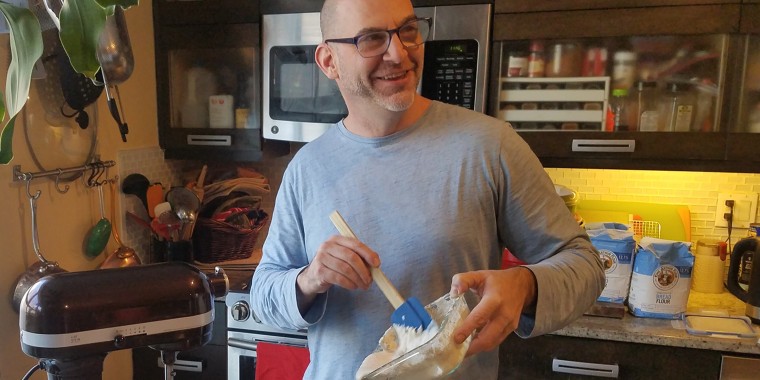When life becomes stressful, Jono Waks bakes.
He first started with cakes, which he happily brought to meetings to share. When too many people politely declined, he started making focaccia bread. He liked that in only a few hours he has beautiful loaves of bread. As he experimented more with baking, he knew he wanted to challenge himself with sourdough, a bread that takes a few days and careful nurturing. He just never found the time.
Now that the spread of coronavirus has shut down many parts of the country and everyone is practicing social distancing, Waks has committed to sourdough in earnest.
“It’s a nice distraction,” the marketing and public relations professional in New York City told TODAY. “Baking forces you to pay attention. It is a nice break from virus news, stock market news … There is that element that you are breaking away.”

Waks, 52, and others have been employing various approaches to stay sane during the coronavirus pandemic. Stress baking remains popular, but people are truly becoming creative with how they cope with fears and isolation. Ritchie Hudson’s in-laws Camillo Morselli and Milena Tassi, who live in the Emilia Romagna region of Northern Italy, dealt with their country’s shutdown by bottling 300 bottles of lambrusco and trebbiano wines.
“I think the winemaking is helping them,” Hudson, 39, an American living in Zurich, told TODAY via Facebook Messenger. “They are doing still doing well — of course given the circumstances.”
Shilagh Mirgain, a psychologist at the University of Wisconsin Health, said that focusing on long-term projects and learning new skills is a powerful way to boost well being and help people cope.
“I like to refer to this as developing corona goals,” she told TODAY. “A lot of people have heightened stress. Having a clear sense of purpose helps us.”
Many are experiencing more anxiety, depression, sadness, isolation and fear as they figure out what the pandemic’s impact on their lives and the world will be. Engaging in an activity that requires focus and learning helps people deal with their feelings.
“Many people are fixated on the news, talking about their fears, having difficulty sleeping, ruminating on it. When you shift gears and do something creative, that allows you to tap into your experiences in another way,” Mirgain said. “When we engage in that creativity, we connect with that capacity that has helped us survive. We create meaning.”
Finding meaning and engaging in positive activities bolsters health.
“We want to minimize stress and anxiety because it weakens the immune system,” she said. “These practices help keep our immune system healthy and our bodies strong.”
But making something isn’t the only way that people are managing their coronavirus-fueled anxiety. Adrian Hoppel started a COVID-19 virtual book club after seeing a Tweet from Stephen King that said “No, coronavirus is NOT like THE STAND. It’s not anywhere near as serious.” The group’s first book? “The Stand.”
“I thought it was pretty funny. I posted it on a whim, ‘Wouldn’t it be funny to have a virtual book club since we’re never allowed to leave the house?’” Hoppel told TODAY. “The response was overwhelming.”
His focus on dark humor is yet another way people deal with adversity. Mirgain hopes people find as much humor as they can.
“When we laugh it helps reduce stress. It releases a cascade of chemicals in the body that can lead to resilience,” she said.

Dozens of people joined Hoppel’s book club from all over the country and even as far away as New Zealand. Hoppel knew some of the members, but enjoyed connecting with others as they navigate a strange new world.
“It felt like a way for me to get rid of some of my anxiety by placing it in the story arch of the book,” the graphic designer from Philadelphia said. “It is a silly little Facebook group reading a big novel. But it is a way to say, ‘We are all going through this together. We are having these shared experiences.'”
Hoppel, 46, hopes the club will virtually meet as long as everyone needs to and isn’t sure what book might be next. Waks, who has been dropping off bread to neighbors, has a new skill he’d like to master: pastry lamination for croissants.
“That is on my challenge list to learn pastry in the upcoming weeks,” he said. “I was joking that if we all go into quarantine, I’ll start baking pita and slide it under the doors.”


